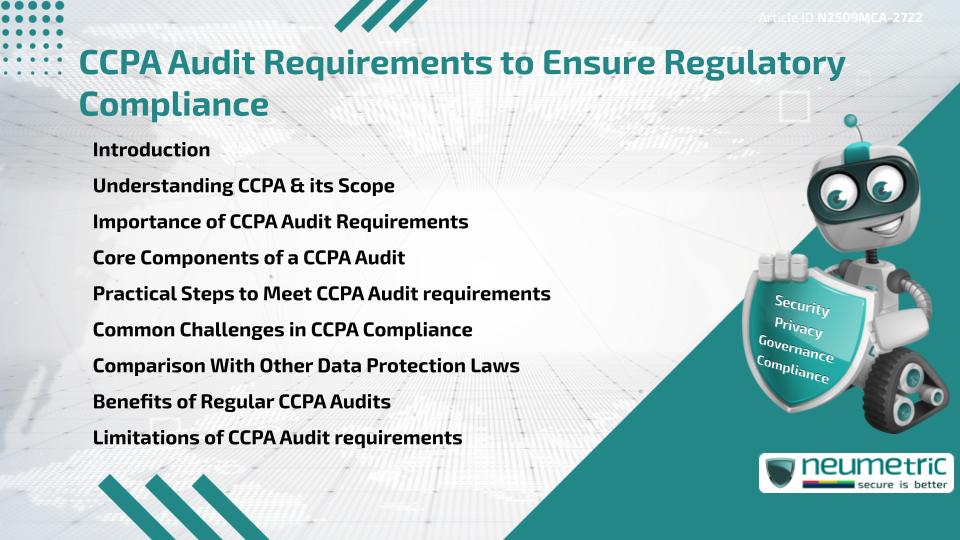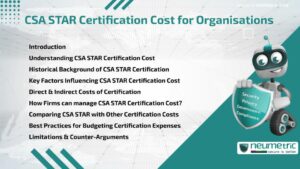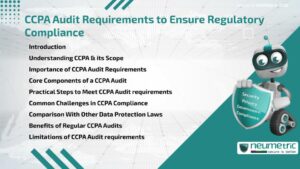Table of Contents
ToggleIntroduction
The California Consumer Privacy Act [CCPA] sets a strong Framework to protect Consumer Data Privacy, requiring businesses to be transparent in how they collect, process & share Personal Information. To achieve this, CCPA Audit requirements play a critical role in ensuring Regulatory Compliance. These Audits involve examining Company Practices, assessing Risks & implementing Corrective Measures. Meeting these requirements not only helps avoid penalties but also builds Trust with Consumers, promotes Transparency & strengthens organisational Accountability.
Understanding CCPA & its Scope
The CCPA applies to businesses that meet specific thresholds, such as generating annual revenue above twenty-five million dollars, handling Personal Data of more than fifty thousand California residents or deriving at least fifty percent of their revenue from selling Personal Data. Unlike general Privacy Policies, the act gives Consumers rights to access, delete & opt out of data sales. This wide scope makes CCPA Audit requirements essential for any qualifying business.
Importance of CCPA Audit Requirements
Audits act as checkpoints to verify Compliance with CCPA obligations. Without regular Audits, businesses Risk overlooking gaps that may result in hefty fines or lawsuits. Moreover, Consumer awareness around Privacy is increasing & Compliance Audits provide a way to demonstrate Accountability. Just as Financial Audits strengthen investor confidence, CCPA Audit requirements reinforce Consumer confidence in data handling practices.
Core Components of a CCPA Audit
A thorough CCPA Audit should cover:
- Data Mapping: Identifying what Personal Data is collected, where it is stored & how it flows across systems.
- Consumer Rights Management: Verifying processes for responding to requests like data access or deletion.
- Third Party Contracts: Ensuring Agreements with Vendors align with Privacy obligations.
- Security Measures: Reviewing Policies for safeguarding Sensitive Data from Breaches.
Practical Steps to Meet CCPA Audit requirements
To comply effectively, Organisations should:
- Develop clear Privacy Policies & keep them updated.
- Train Employees on CCPA obligations.
- Use Compliance software to automate record-keeping.
- Conduct mock Audits to test preparedness.
- Maintain documentation of Consumer requests & Company responses.
Common Challenges in CCPA Compliance
Many businesses struggle with fragmented data systems, making it difficult to locate & manage Consumer information. Others face difficulties with Vendor oversight, especially when Third Party partners operate outside California. Additionally, smaller companies may find the cost of meeting CCPA Audit requirements overwhelming.
Comparison With Other Data Protection Laws
While CCPA is specific to California, its requirements share similarities with the General Data Protection Regulation [GDPR] in Europe. Both emphasise Consumer rights & business Accountability, but GDPR is broader in scope. Comparing the two helps businesses streamline Compliance strategies & avoid duplication of effort.
Benefits of Regular CCPA Audits
Carrying out Audits regularly offers clear advantages, including reduced Risk of Penalties, stronger Consumer Trust & smoother operations. Businesses that integrate Audits into their yearly Compliance calendar often discover efficiencies that improve both data Governance & Customer satisfaction.
Limitations of CCPA Audit requirements
Despite their importance, Audits are not a cure-all. They provide a snapshot in time & cannot guarantee that all Compliance Risks are eliminated. Fast-changing technologies & evolving Consumer expectations may create gaps that Audits alone cannot address. Therefore, businesses must pair Audits with ongoing Risk Management efforts.
Conclusion
CCPA Audit requirements are indispensable for businesses that want to comply with the law & maintain Consumer Trust. They demand consistent effort, structured processes & proactive engagement with both Internal Teams & External Vendors.
Takeaways
- CCPA applies to businesses meeting specific thresholds, making Audits crucial.
- Core Audit elements include Data Mapping, Consumer rights & Vendor oversight.
- Regular Audits reinforce Transparency & Consumer Trust.
- Audits have limitations & must be complemented with ongoing Compliance activities.
FAQ
What are CCPA Audit requirements?
They are structured assessments of business practices to ensure Compliance with the California Consumer Privacy Act.
Who needs to conduct CCPA Audits?
Any business meeting the revenue, data volume or data sales thresholds outlined in the act must carry out Audits.
How often should CCPA Audits be performed?
Most businesses conduct Audits annually, though high-Risk Organisations may benefit from more frequent reviews.
What happens if a company fails to meet CCPA Audit requirements?
Non-Compliance may result in Financial penalties, Reputational damage & Consumer lawsuits.
How are CCPA Audits different from GDPR Audits?
Both focus on Consumer Rights & Data Protection, but GDPR is broader & stricter, covering businesses beyond Europe.
Can Small Businesses be exempt from CCPA Audits?
Yes, if they do not meet the defined thresholds, but many still choose to perform Audits voluntarily to enhance Trust.
Do CCPA Audits require Third Party assessors?
Not necessarily. While Third Party Audits add Credibility, businesses can perform internal Audits if they follow the required standards.
Need help for Security, Privacy, Governance & VAPT?
Neumetric provides organisations the necessary help to achieve their Cybersecurity, Compliance, Governance, Privacy, Certifications & Pentesting needs.
Organisations & Businesses, specifically those which provide SaaS & AI Solutions in the Fintech, BFSI & other regulated sectors, usually need a Cybersecurity Partner for meeting & maintaining the ongoing Security & Privacy needs & requirements of their Enterprise Clients & Privacy conscious Customers.
SOC 2, ISO 27001, ISO 42001, NIST, HIPAA, HECVAT, EU GDPR are some of the Frameworks that are served by Fusion – a SaaS, multimodular, multitenant, centralised, automated, Cybersecurity & Compliance Management system.
Neumetric also provides Expert Services for technical security which covers VAPT for Web Applications, APIs, iOS & Android Mobile Apps, Security Testing for AWS & other Cloud Environments & Cloud Infrastructure & other similar scopes.
Reach out to us by Email or filling out the Contact Form…





